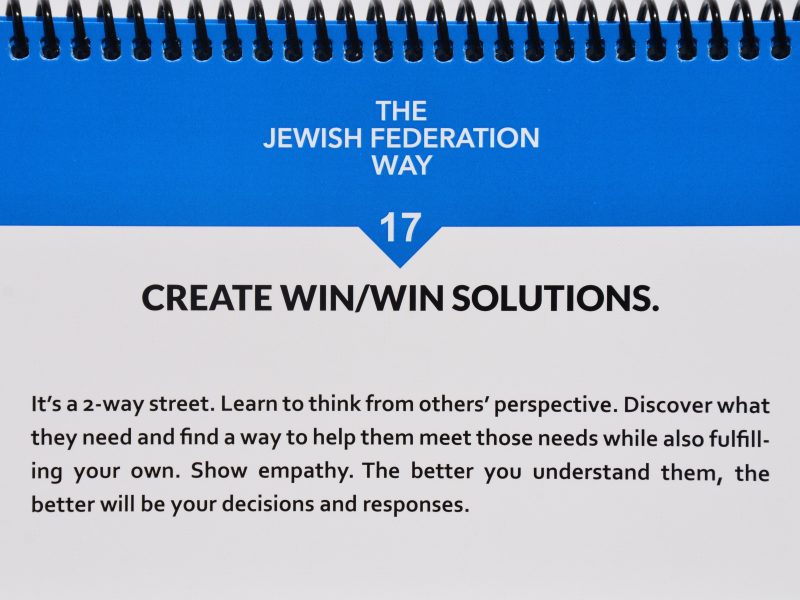Danielle V. Minson — Raising the Bar

Fundamental #17: Create Win/Win Solutions
For the better part of two years, our Federation team has been making a deliberate effort to define what drives our work and how we do it. The four core values of Community, Inclusivity, Learning, and Integrity rose to the top. The next step was to identify a list of fundamentals: actionable, daily core behaviors that bring our core values to life and define our culture. Each week, we make a point to focus on practicing a different fundamental, and I kick off that effort by sharing my thoughts on each one at the beginning of each week. Here are my thoughts for our seventeenth week:
CREATE WIN/WIN SOLUTIONS —Learn to think from the other’s perspective. Discover what they need and find a way to help them meet those needs while also fulfilling you own. Show empathy. The better you understand them, the better will be your decisions and responses.
The idea of “Win/Win” solutions is so overused that it’s become misunderstood as simply being willing to cooperate or compromise.
Actually, to design a Win/Win solution requires several steps. First, we must investigate to understand the other parties actual goals and viewpoints (which may differ from their stated goals). Then we have to think through in which areas we can meet the other party’s goals without betraying our own key goals. Along the way, we have to build trust, candor and mutual respect and appreciation.
The name of the recent “Congregation and Community Israel mission” has “Win/Win” embedded in its name—it was designed to strengthen both congregations and community. What the name doesn’t tell you is that for decades the Federation’s Israel trips in some ways competed with congregation’s Israel trips. The congregation’s trips offered participants the opportunity to see Israel through the eyes of the rabbi and through the lens of their style of Jewish observance. By contrast, the Federation trips often offered insights into Israel society explained by some of Israel’s most renowned thought leaders. They also offered personal connections with Israelis through our partnership city of Netanya. This meant that participants had to choose. And it meant that both Federation and the congregations usually had smaller groups than would be ideal. Combining the best of both types of trips makes sense and sounds obvious? So why has it been accomplished so rarely across the country?
Because as everyone who worked on it will tell you, to make it a win for nine different congregations and rabbis, the Federation and the rabbis had to give up significant components of their traditional trips. Everyone also had to give up some control.
And sometimes, to preserve a larger Win/Win solution some compromises have to be jettisoned. For example, at first it seemed obvious that all nine congregations should join in a community-wide Shabbat dinner on Friday night. However, when Barb tried to negotiate, she saw that since every congregation has specific traditions and rituals it would require so much compromise that no one would be happy.
However, because the rest of the trip really was a Win/Win, the level of trust between the Federation and the rabbis has reached an all-time high—making new Win/Win solutions possible. And on and on…..
We can all get more done and be more gratified if we find Win/Win solutions between organizations, departments and colleagues. And mastering this approach can help us in our personal lives as well.
As always, please let me know if you’d like to discuss this or any of our fundamentals.
See here for Shep’s comments on all the fundamentals so far.

